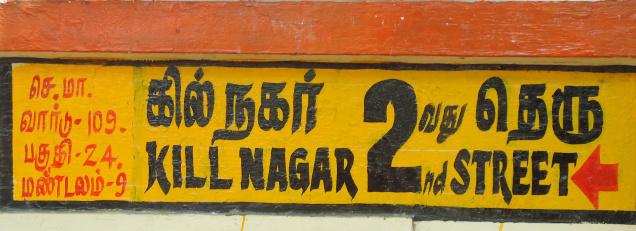
Lt. Col. G.S. Gill was among the first of the prominent Punjabis who settled in the city and made important contributions
Fellow heritage enthusiast Sreemathy Mohan posted this photograph on Facebook leading to much merriment. Ironically, the ‘Gill’ who is commemorated was a doctor and therefore, technically, a giver of life.
Born on September 16, 1893, Gurdial Singh Gill was from Faridkot, Punjab. Sent to England to study law in 1912, he opted for medicine and moved to Edinburgh University from where he graduated in 1919, throwing in for good measure, a few months service in the Indian Field Ambulance Training Corps during the World War I.
Dr. Gill and his English wife Rena Lister Gill set up his practice and home at Bolton near Manchester for a while and raised a family of four sons. In 1923, they came to India where he joined the Indian Medical Service (IMS) and became Lt. Col. G.S. Gill, IMS. With the IMS being abolished in 1930, he moved to prison service and became inspector general of prisons, Madras, which meant all gaols in the presidency were under him. Most Madras-based Congress leaders arrested during the Quit India movement became his wards and there developed a close affinity between them and the warm-hearted Sikh.
Post independence, Gill opted to stay on in Madras. He and other prominent Punjabis settled here at that time were to make important contributions to the city. The Punjab Association was founded in 1937. The body was to be tested to the hilt in 1947 when scores of Partition refugees began arriving, most having no idea about the city to which they were making their way.
Lt Col. Gill would invariably meet them at the station. A ‘sharanagat rahat punarvas’ (refugee rehabilitation) committee was set up and with money obtained from donations, a colony was formed. The enterprising newcomers soon struck roots, becoming successful entrepreneurs and professionals. The colony became Gill Nagar.
Lt. Col. Gill was a close confidante of Maharani Vidyawati Devi Sahib of Vizianagaram, a princess from Keonthal near Shimla, who had married into a princely Andhra family and had, like him, been transplanted to the South. Sarvepalli Radhakrishnan had been an early protégé of hers. In her, Gill found a powerful patron and supporter. In 1951, when the Punjabis in Madras felt the need for a gurudwara, it was the Maharani who helped. Work began in 1952, with Gill personally supervising the work. When the Maharani died she left her personal properties in a Trust to be administered by Gill, the income to be used for education.
Being the founder president of the Guru Nanak Society, in 1971, he got the Trust to part-fund the Guru Nanak College. Gill Adarsh Matriculation Higher Secondary School, set up in the 1980s and managed as one of the Adarsh Vidyalaya Schools run by the Punjab Association, also commemorates him. Lt. Col. Gill died in May 1982. His son was the celebrated Lt. Gen. I.S. Gill, PVSM, MC, whose life was documented in ‘Born to Dare’ by S. Muthiah.
source: http://www.thehindu.com / The Hindu / Home> News> Cities> Chennai / by Sriram V / June 04th, 2013